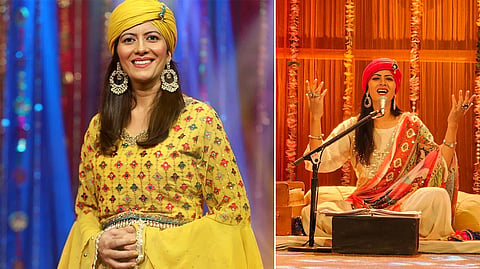

HYDERABAD: The atmosphere in the hall was electric, with everyone at the cultural event singing and enjoying each song and poem showcased. The Sahityotsav Jashn-e-Adab Cultural Kaarva, held recently at the DDE Auditorium, MANUU, Gachibowli, was a vibrant celebration of diverse art forms. Among the highlights was a mesmerising Sufi performance by the renowned Dr Mamta Joshi & Group, who lit up the stage with songs that had the audience dancing and singing along. Following her remarkable performance, we had the opportunity to speak with her in an exclusive interview.
When asked if this was her first time performing in Hyderabad, she shared, “I’ve been here before. I recall coming here as a student for a youth festival with Kapil Sharma and Suganda Mishra. We had a team back then, and I was representing Guru Nanak University, Amritsar. That was my first time performing in Hyderabad. I thoroughly enjoyed it and explored the city. This time, though, due to time constraints, I couldn’t see much of the city. Hyderabad is lovely, and the audience here is very warm. It’s wonderful to see how this city in the South embraces and appreciates different cultures, including Punjabi, Urdu, and Hindi.”
Despite battling a severe throat pain during her performance, Dr Mamta Joshi delivered an exceptional show. She explained, “Last month, I was in Mumbai for a meditation course that included a 30-day fast where I couldn’t speak. When I began talking again, my voice sounded different. The Jashn-e-Adab event demanded dedication, and this was my first concert after giving my voice a long rest. I decided to leave the concert’s direction to the audience, especially since many youths who enjoy ghazals were present. The love from the audience was overwhelming, and the concert went on for almost an hour and a half. By the end, my voice started to improve, and I marvelled at how beautifully everything fell into place. Singing with the audience made it perfect.”
Discussing the challenges of Sufi music, she remarked, “It’s a challenge for those stepping out of their comfort zone. For example, if someone accustomed to singing rap or pop is asked to sing Sufi, it becomes challenging. But when you’re doing what you’re naturally inclined towards, it doesn’t feel like a challenge. I’ve embraced what’s within me, which is why I find joy in singing. My study pattern has been influenced by Gautam Buddha, and my favourites are Nanak and Kabir. Adapting and performing in this style doesn’t seem difficult to me.”
Sufi music has been deeply ingrained in our culture for decades, and reflecting on her journey, Dr Mamta Joshi shared, “I learned music from my grandfather and am the first woman in my family to sing professionally. I never imagined I would pursue it as a career or express it so openly. It’s rare to find support for such talent, but my husband, a music lover, encouraged me to pursue it. That’s why I’m here today. Singing since childhood, I never realised when I became so professional.”
On her professional inspirations, she said, “I draw inspiration from Nusrat Fateh Ali Khan, whose songs are still cherished today. His focus and audience interaction were remarkable. Sufi music requires a mentor to guide you correctly, and when spirituality connects with this art form, it becomes even more profound. When I began singing Kabir’s verses, I felt certain vibrations. Kabir’s poems have helped me through ups and downs. Mirza Ghalib also plays a significant role in my life; his life story resonated with me, and I incorporated his essence into my art. Those who listen to my music eventually fall in love with it.”
Talking about the significance of music in her life, she said, “Music is a powerful tool for transformation. There have been instances where music has transformed great kings like Akbar. When you’re stressed, listening to someone sing can instantly make you feel better. Music first transforms the performer before it reaches the audience. It’s healing and therapeutic, bringing immense joy.”
Kunwar Rajeet Chauhan, the internationally acclaimed poet and Founder of Sahityotsav Jashn-e-Adab, added, “This is one of the biggest cultural festivals in the country, and it’s called Cultural Karva. Our organisation, which is about 13-14 years old, has become one of the biggest promoters of art and culture. This is our first time in Telangana. We covered the South in 2023, showcasing all facets of Hindustani Art and Culture. This is a complete package aimed at reconnecting the youth with their roots. Hyderabad, known for its poetry and Sufi traditions, has been very receptive, and it’s heartening to see such large audiences for these programmes.”